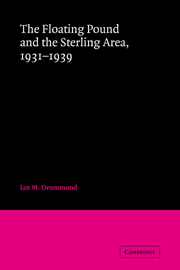Book contents
- Frontmatter
- Contents
- Preface
- 1 Introduction: the sterling area in the 1930s
- 2 Sterling and the rupee
- 3 The Canadian debate over money and exchanges, 1930–1934
- 4 South Africa, sterling, and the gold standard, 1931 and thereafter
- 5 Australia and New Zealand, 1930–1939
- 6 Monetary preparations for the World Economic Conference
- 7 United Kingdom policy at the World Monetary and Economic Conference
- 8 Talking about exchange stabilization, autumn 1933 through June 1936
- 9 The Tripartite Agreement of 1936
- 10 Intergovernmental conversations and the management of sterling, 1936–1939
- 11 Conclusion: the significance of sterling
- Notes
- Index
7 - United Kingdom policy at the World Monetary and Economic Conference
Published online by Cambridge University Press: 07 October 2011
- Frontmatter
- Contents
- Preface
- 1 Introduction: the sterling area in the 1930s
- 2 Sterling and the rupee
- 3 The Canadian debate over money and exchanges, 1930–1934
- 4 South Africa, sterling, and the gold standard, 1931 and thereafter
- 5 Australia and New Zealand, 1930–1939
- 6 Monetary preparations for the World Economic Conference
- 7 United Kingdom policy at the World Monetary and Economic Conference
- 8 Talking about exchange stabilization, autumn 1933 through June 1936
- 9 The Tripartite Agreement of 1936
- 10 Intergovernmental conversations and the management of sterling, 1936–1939
- 11 Conclusion: the significance of sterling
- Notes
- Index
Summary
This chapter, like the preceding one, concentrates upon the monetary side of the World Conference that gathered in June 1933. We are chiefly interested in the relations between Britain and the overseas sterling area, especially India and the Dominions. To make sense of these interimperial interactions we need to follow certain developments at the conference itself. The first section of the chapter therefore traces the increasingly odd behavior of the Americans and the increasingly vigorous importunities of the French. In the second section we shall see how Empire delegates, ill informed but concerned about Britain's policy, demanded a change of direction and how Chamberlain devised a verbal response for the sake of Empire solidarity.
Problems with the French and the Americans
The conference assembled on 12 June 1933. There was the usual mixture of plenary sessions, committee and subcommittee work, and informal discussion behind the scenes. Outside the conference proper were the conversations on currency stabilization. These conversations were conducted between treasuries and central banks. Only Britain, France, and the United States were involved. The purpose was not to peg the three moneys permanently to one another, or to gold, but rather to devise a formula for their temporary alignment during the term of the conference only.
The interbank conversations were conducted against a background of gathering gloom. The dollar was depreciating steadily against gold, and speculators were moving funds from the smaller gold-standard countries of Europe.
- Type
- Chapter
- Information
- The Floating Pound and the Sterling Area1931–1939, pp. 162 - 180Publisher: Cambridge University PressPrint publication year: 1981



